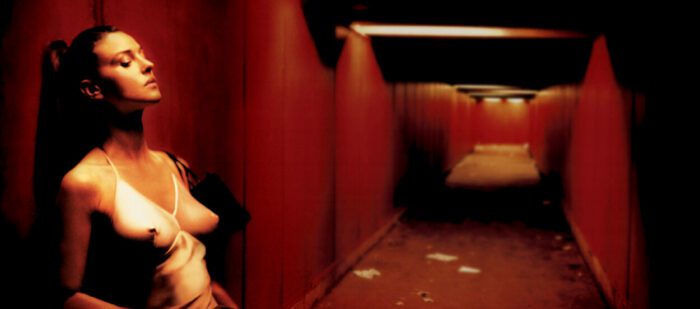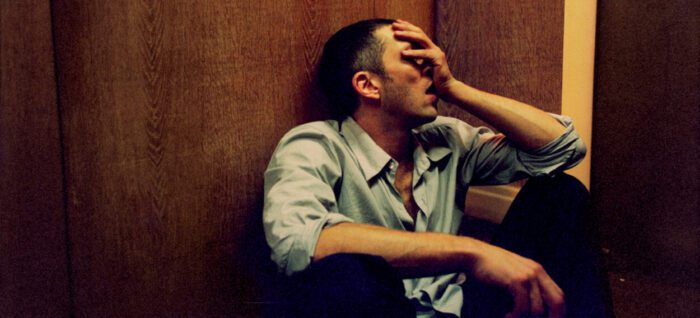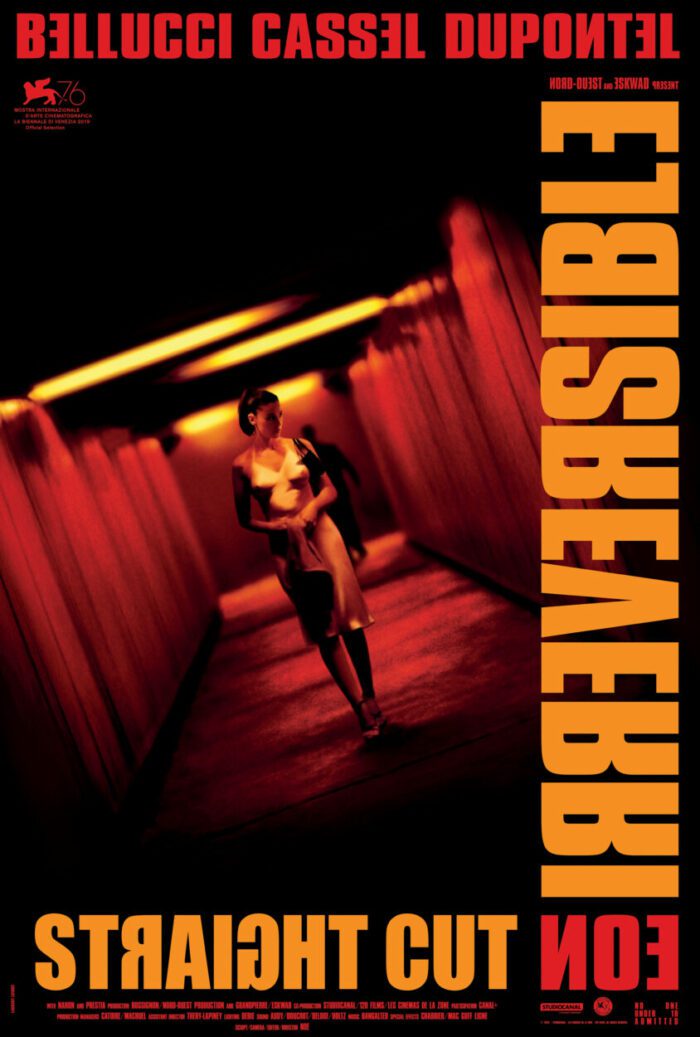*Warning: The themes of Irreversible that include extreme violence and sexual assault. Please stop reading if this is likely to cause upset.
There are few films, certainly on this side of the new millennium, that have caused as much controversy and divided opinion like Irreversible has. Gaspar Noé’s 2002 French Extremist rape-revenge shocker created a storm during its festival appearance at Cannes in 2002, with approximately 200 audience members said to have left during the screening and 20 people injured after fainting. The combination of the film’s assaulting form, presentation, and content was too much for a substantial number of viewers, but subsequently the film has attracted a sizeable number of audience members and critical theorists alike who have come to Irreversible’s defence.
Noé’s film went out of its way to depict rape and the subsequent violence of looking for revenge in the starkest way possible, most infamously during a pivotal scene featuring Monica Belluci’s character Alex where the camera remains static and unflinching for an agonising nine minutes, but also in its queasy, disorientating, anxiety-making use of sub-bass sounds, electronic whines, and a camera that seems untethered to the law of gravity and wheels around like a whirling dervish. Most famously, however, the film played with form and time by telling its story backwards, much in the same way Memento did, starting at the end with an ambush on the senses and ending with a sense of calm that became horrifyingly ironic when assessed in the light of the what happened in the ninety minutes previous to it.
“Time Destroys All Things” runs a caption from the film, but twenty-one years on from the film’s assault on the cinematic senses, Irreversible is back to destroy us with the release of Irreversible: Straight Cut. Rereleased by U.S. company Altered Innocence, a film distributor “specializing in Edgy and Artistic Foreign, Queer, and Coming-of-Age Cinema”, the release sees both the original cut of the movie and the reassembled ‘straight cut’ packaged together on both Blu-ray and DVD, remastered in 2K and with an abundance of exciting special features, including a thought-provoking and well-considered video essay called, naturally, “Time Destroys All Things” by author and film critic Alexandra Heller-Nicholas, as well a new 42-minute featurette featuring interviews with Gaspar Noé, Monica Bellucci and Vincent Cassel amongst others.
The 2K remasters are beautiful, bringing a new clarity to certain scenes, especially where the camera is at its most frenetic. Previously those scenes looked a bit muddy to my eye but the amount of newly visible detail I found myself noticing here was remarkable.

So what exactly is the Straight Cut? Well, Gasper Noe is known to use filmic form to play with arguably perverse situations and story elements in his narratives, and yet perhaps the most perverse thing Noe has done to Irreversible is to recut it so that the Straight Cut shows the events of the film running in chronological order, like the majority of other films. When the outlandish become commonplace, shock with normalcy.
An argument could be made that reassembling Irreversible into chronological order dilutes some of the film’s power. Indeed, part of the shock of the original cut of Irreversible is that absolutely shattering (literally) violence that represents the end of the story actually attacks the audience from the very start and plunges them right down the rabbit hole of masculine rage and violence and female sexuality, agency and victimhood. Even though the end of the film is the start of the story and therefore actually concludes Irreversible with moments of calm, it does not soothe us, the audience. A revelation made near the end of the film in the original cut, while seeming run of the mill if viewed chronologically, actually takes on awful gut-wrenching significance when viewed at the end of the film, casting a tragic light over the other events of the film.
However, I would argue that the Straight Cut holds its own power, one which is perhaps less immediately assaultive of the audience but establishes its strength by shifting the focus of the context in which the story is viewed. The original cut pares the film back further and further as it unravels, until we are just left alone with the character of Alex. Even thought the narrative is told backwards, in terms of the order we see events in, the focus becomes more and more centred on Alex, played with astonishing vulnerability and strength by Monica Bellucci. The context in which we analyse and assess the events the film presents to us is one of female trauma. Our focus becomes directed to the way the female body is treated, viewed and what some of the implications of this could be.
By featuring events in chronological order, The Straight Cut by necessity shifts us focus onto the male side of things. And while Irreversible was never shy to show its disgust with the idea of assaulting women, the Straight Cut does not let any of the men off the hook. No, not just the perpetrator of the assault on Alex, but the Straight Cut shifts its context to shine light on the men in Alex’s life: her wild, party-loving partner Marcus (played by Bellucci’s then-real-life partner Vincent Cassel) and her ex-boyfriend and still-friend Pierre (Albert Dupontel).

Because we see the ‘good’ times of Alex’s life first in this cut, as she lies post-coital with Marcus and shares jokes and affection with Pierre, our attention is drawn anew in this cut to the mens’ behaviour, something the original cut didn’t draw as much attention to simply by virtue of the fact the mens’ act of violence occurs right at the start, meaning the focus for much of what remains falls on Alex. Here, we can see attitudes on display both Marcus and Pierre has having attitudes that make them just as culpable in a wider sense of the trauma and violence women experience. Marcus is a womaniser, constantly grabbing at Alex and sexualising her as the get ready for the party, the same party where a coked-up Marcus kisses other women while Alex dances alone.
Pierre, meanwhile, is obsessed with discovering the reason why he couldn’t bring Alex to orgasm during their relationship, constantly questioning Marcus if he has done it and how. Alex laughs it off, but for an ex-boyfriend to still sexualise and discuss Alex as a sexual object, even in front of her current partner, shows the narrow, physical way Pierre sees Alex, even as he mopes like a puppy after her. He may indeed still lover her, but his obsession with her sexual satisfaction, or lack of, gives the game away as to an objectifying attitude that taken to its extreme can have awful consequences for women. The Straight Cut brings a new focus to this in a way the original cut doesn’t.
Irreversible: Straight Cut is not going to change your mind about the film if you do not see the worth in the original cut. But as a complement to the original, the Straight Cut brings out a new focus in the story, giving more depth to the film’s discussion of sexual politics in relation to violence and therefore is most certainly worth seeking out.
Altered Innocence presents the Blu-ray and DVD release of Irreversible: Straight Cut, available for pre-order at VinegarSyndrome.com, including the following:
- New 2K restoration of the Original Cut (2002 / 94 Minutes)
- New 2K restoration of the Straight Cut (2020 / 86 Minutes)
- The Irreversible Odyssey: A new 42 minute featurette re-visiting the film 20 years later and featuring interviews with Gaspar Noé, Monica Bellucci, Vincent Cassel and others.
- Time Destroys All Things – A video essay by Alexandra Heller-Nicholas
- SFX Featurette: Go behind the scenes of Irreversible’s special effects
- Two Music Videos by Daft Punk’s Thomas Bangalter directed by Gaspar Noé
- Original Teaser Trailers
- Restoration Trailer
- Other Trailers




